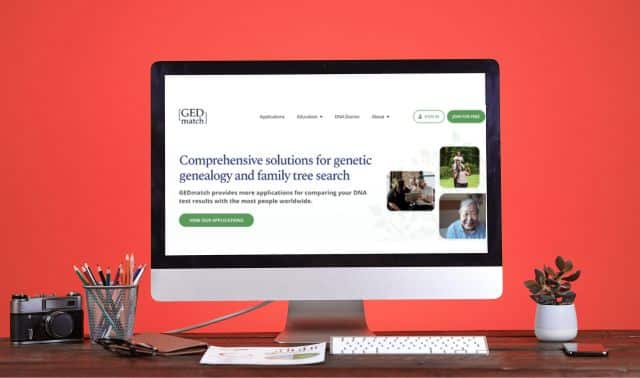Sign up for the Family Tree Newsletter! Plus, you’ll receive our 10 Essential Genealogy Research Forms PDF as a special thank you.
Get Your Free Genealogy Forms
"*" indicates required fields

Matching with relatives. Discovering your ethnic background. Solving genealogical questions. We frequently discuss these benefits of having your DNA tested, but another use comes up less often in genealogy circles: learning about your health. Along with ancestral information, your genes contain data that impacts your predisposition towards various health conditions, plus hints about how your body will respond to foods, sleep, exercise and more.
Health results are an increasingly important focus for commercial DNA tests. For years, 23andMe was the dominant player in this field, providing both genealogical and health-related DNA results. But other companies are catching up, with three of the other “Big Five” testing companies offering such tests: AncestryDNA, Living DNA and MyHeritage DNA. (As of writing, the fifth “Big Five” testing company, Family Tree DNA, doesn’t offer health-related testing.)
With all these new options, which DNA test is best for health-related information? I’ve tested at the four major players, and in this article I’ll share the features, pros, and cons of each.
ADVERTISEMENT
Editor’s Note: Ancestry discontinued AncestryHealth in July 2021. AncestryHealth kits are no longer available for purchase, and AncestryHealth reports are no longer available to view or download.
The Science of Health DNA
Before we look at the tests in detail, let’s have a quick primer on genetic genealogy and what these commercial tests look for.
First, some terminology: Humans have 23 pairs of chromosomes, each of which contains many genes. A gene is a segment of DNA that contains coded instructions about how a cell operates.
ADVERTISEMENT
Humans share some DNA with all living organisms (even other animals, such as cats and dogs). In fact, humans—as different as we sometimes seem from each other—share 99.5% of DNA with each other. The genes that make up that 0.5% difference account for all the biological diversity among people.
Most of those differences between humans, called variants, are inconsequential or simply account for the normal, statistical variation among us. But some variants are identified with people who lived in a specific geographic region (and thus are useful for genealogical purposes), while others can affect our health and even cause serious diseases. DNA tests for health focus on those latter variants.
Most medical conditions are caused by a combination of genetic factors and non-genetic factors, such as lifestyle and environment. By studying your genetic health factors (also called genetic risk), you can make better decisions when managing your health and lifestyle choices.
As with tests focusing on your heritage, health DNA tests generally require you to provide a saliva sample, then mail it to a lab for analysis. A few weeks later, you’ll receive a link to view your results online. The information provided by health DNA tests varies by company, but typically includes three elements:
Genetic health risk reports, also called risk predisposition reports, indicate if you have genetic variants associated with an increased risk for certain health conditions, such as hereditary breast cancer, Parkinson’s disease and Alzheimer’s disease. Just because you have a variant doesn’t necessarily mean that you will develop the condition. Lifestyle and environment also affect whether you develop most conditions. Likewise, you could develop the condition even if you aren’t genetically predisposed, and these tests might not detect all the genetic risk variants for the condition.
Carrier status reports tell you whether you “carry” a genetic variant (i.e., that you have an unexpressed variant) associated with a certain genetic disorder, such as cystic fibrosis or hereditary hearing loss. Usually, the variant won’t affect your health, but you might pass it on to your children. Typically, if both parents are carriers for a particular disease-causing variant, there’s a 25% chance their child will have the disease. Some genetic variants are more common in people of certain ethnicities, such as sickle cell disease in African Americans and Tay-Sachs disease in people with Eastern European Jewish ancestry.
Wellness reports show how your genes impact various aspects of your health and wellness, such as food metabolism, weight, and how your body processes vitamins. Some tests also cover gluten sensitivity, lactose digestion and physical endurance.
Concerned about privacy, with all that health information floating around? DNA testing companies usually have comprehensive privacy statements, and go to great lengths to ensure that your results remain private. For example, 23andMe says that it won’t share your data with an insurance company or an employer. Diahan Southard discusses the health insurance implications of DNA testing (plus other privacy concerns).
Now that we’ve covered the basics, let’s see what each service has to offer.
23andMe Health + Ancestry
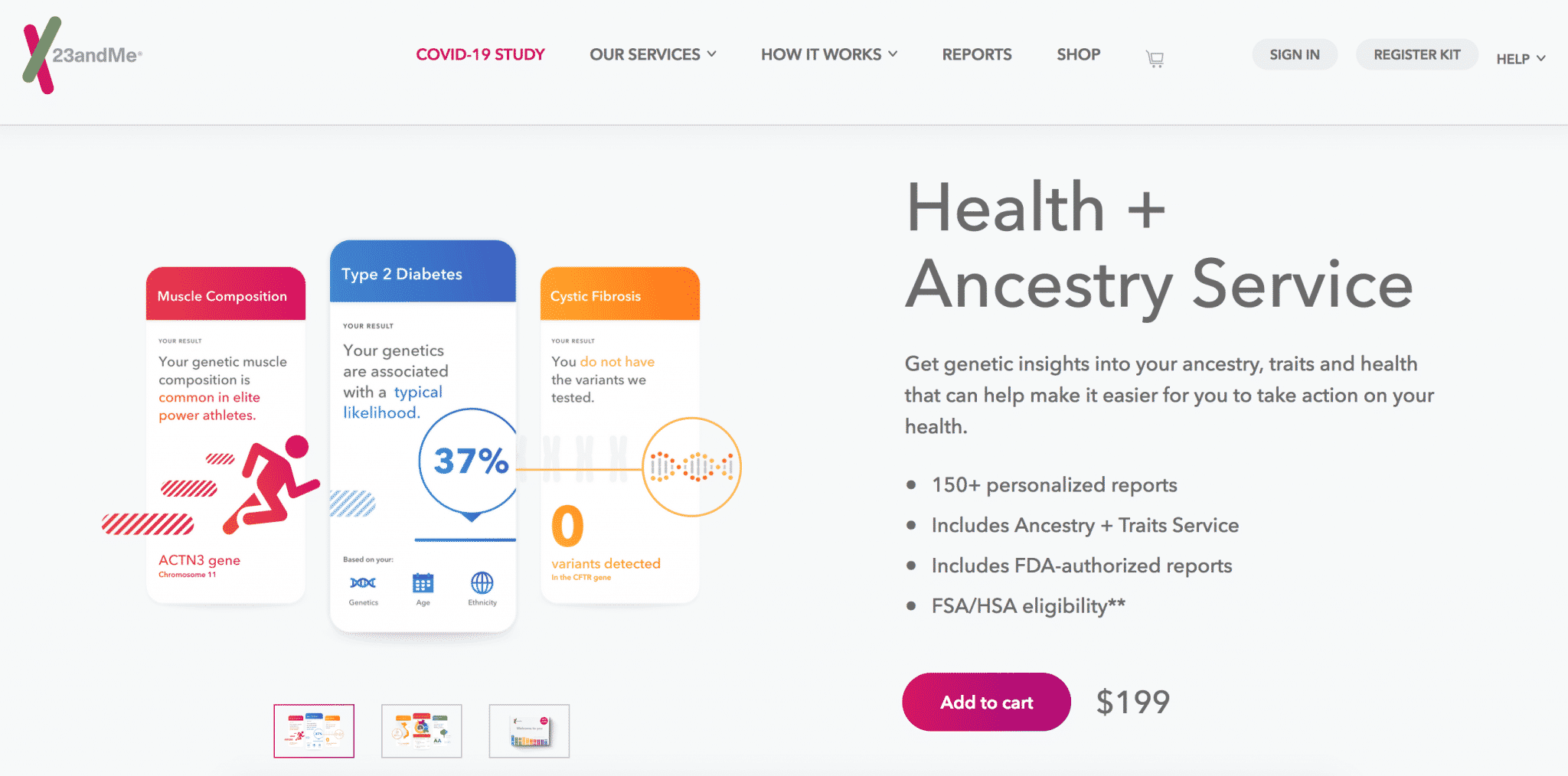
The 23andMe Health + Ancestry test ($199) gives you, by far, the largest selection of health-related reports. In addition to the health reports we’ll discuss here, the Health + Ancestry test includes the ethnicity estimate, DNA matches and traits that come with the $99 standalone Ancestry + Traits test. (If you’ve already taken the Ancestry + Traits test, you can upgrade to Health + Ancestry for $125; you don’t need to submit another DNA sample.) The Health + Ancestry test also includes ongoing updates to your results.
The FDA has authorized 23andMe to sell kits that analyze risk for several diseases, and the Health + Ancestry kit is available in all 50 US states. 23andMe ships to many other countries, too.
Health + Ancestry includes more than a dozen health predisposition reports, including results for Parkinson’s disease and type 2 diabetes. My report shows a slightly increased risk for two conditions: celiac disease and age-related macular degeneration (AMD). I have both of the genetic variants tested for AMD. The description notes that AMD is “the most common cause of irreversible vision loss among older adults.”
The Scientific Details section of the report provides lots of useful information. It says that 61.7% of 23andMe’s customers of European origin have one of the AMD variants tested, and 38.6% of its customers of European origin have the other one. The section also notes that other risk factors, such as smoking and diet, affect who gets AMD. And it says those with parents, siblings or children who have the disease are more likely to develop AMD.
In fact, my mom’s test shows that she has the same two genetic variants for AMD, so (like me) she’s at slightly increased risk. But my dad’s report shows just one variant for AMD, putting him at no increased risk for the disease. (Surprisingly, my dad is the one who actually has AMD.)
You get more than 40 carrier status reports with Health + Ancestry, far more than with any other DNA test. They include cystic fibrosis, sickle cell anemia and Tay-Sachs disease. (No variants for any of them show up in my report.) Each condition includes a helpful overview highlighting key information, plus a more detailed section with scientific details.
For example, the overview of sickle cell anemia says, “Sickle cell anemia is a genetic disorder characterized by anemia, episodes of pain, and frequent infections. A person must have two HbS variants in the HBB gene in order to have this condition.” It also notes that about 1 in 13 African Americans has the HbS variant, and the Scientific Details section says that 7.1% of 23andMe’s African American customers have the variant.
23andMe’s Wellness reports cover topics that you might not expect to be influenced by heredity, such as your caffeine consumption, whether you’re a deep sleeper, and how much you move while sleeping. One report, Genetic Weight, says I’m predisposed to weigh about 7% less than average. (I weigh even less than that.) It lists habits for maintaining an appropriate weight, such as getting enough sleep, eating vegetables and exercising.
The Health + Ancestry report also includes a Health Action Plan based on your genetics. Given my slightly increased genetic risks for celiac disease and age-related macular degeneration, my plan tells how to avoid those diseases and to recognize symptoms.
Review: Despite growing competition, 23andMe’s Health + Ancestry test still provides the most comprehensive health reports of any DNA test.
AncestryHealth
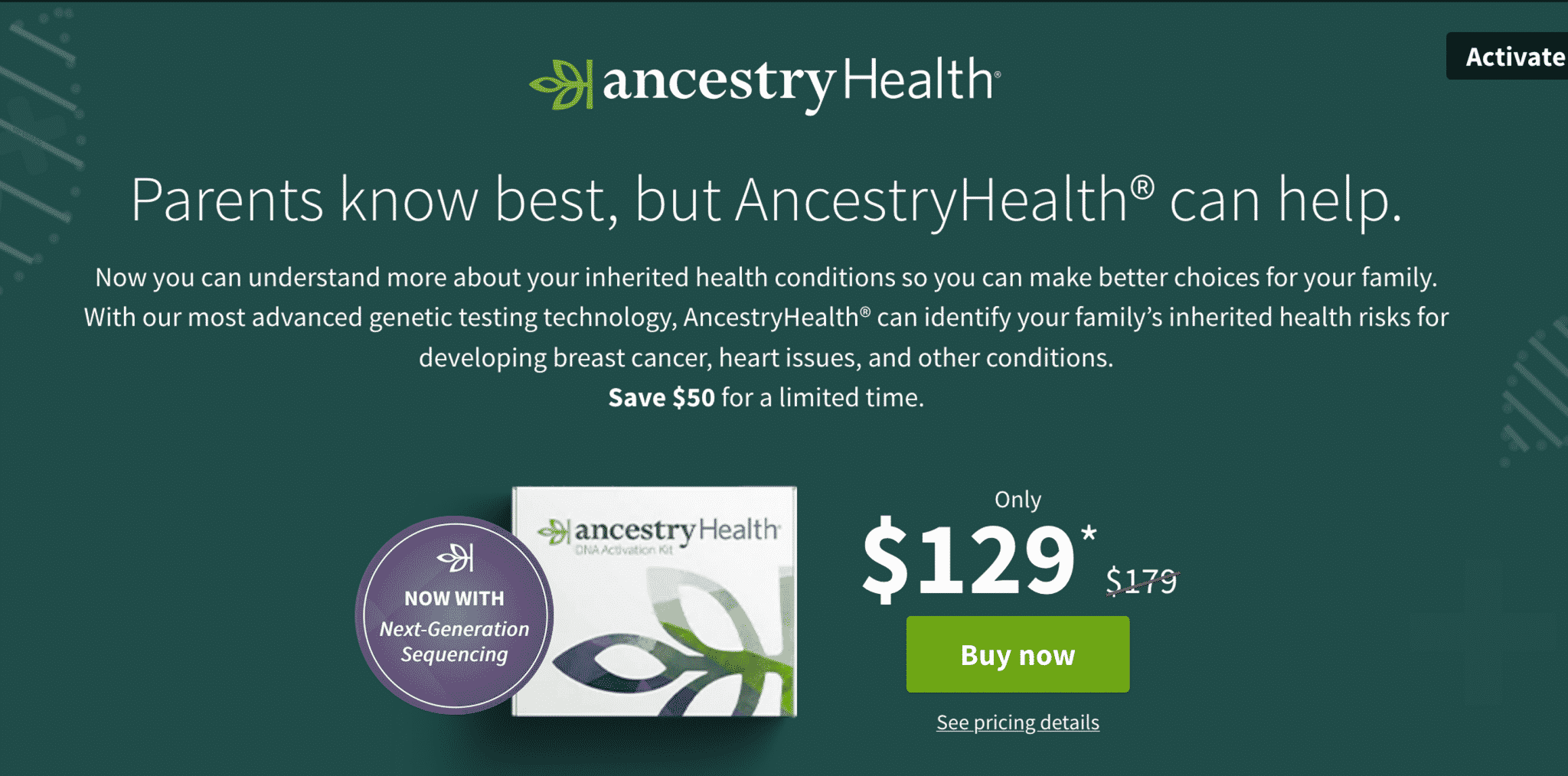
Editor’s Note: Ancestry discontinued AncestryHealth in July 2021. AncestryHealth kits are no longer available for purchase, and AncestryHealth reports are no longer available to view or download.
Launched in late 2019, AncestryHealth ($179) offers reports on heart and blood health and cancer risk, plus the ethnicity estimate and DNA matches that come with the baseline AncestryDNA test ($99) and a few of the traits reports included with AncestryDNA Traits add-on ($20).
If you’ve already taken the AncestryDNA test, you can upgrade to AncestryHealth for $99, and you usually don’t need to provide another DNA sample. AncestryHealth is available only in the United States (excluding the states of New Jersey, New York and Rhode Island).
AncestryHealth’s genetic risk reports seem to focus on the two leading causes of death in the United States: cancer and heart disease. The cancer reports cover hereditary breast and ovarian cancer syndrome, plus Lynch syndrome (which is associated with a genetic predisposition for several types of cancer, such as colon and uterine cancers). Four reports cover heart and blood health, including hereditary hemochromatosis (for which the test looks for two DNA differences that account for more than 99% of cases).
Each genetic risk report includes helpful background information on the condition tested and useful advice, whether or not you have variants for the condition. (“Don’t smoke. Maintain a healthy weight. Eat more vegetables, fruits, and whole grains.”) Webinars and videos are available to people at a higher risk for some health conditions. You can also submit questions to a genetic counselor.
The three carrier status reports on AncestryHealth cover cystic fibrosis, sickle cell anemia and Tay-Sachs disease. Each report describes the condition, notes which ethnicities it affects most often, and includes key takeaways and a summary of what the results mean for you.
In addition, AncestryHealth’s family health history tool helps you organize information to share with your physician. With a graphical family tree, you can show key health information for each of your close relatives. Enter each person’s name and date of birth, indicate their relationship to you, and add known health conditions.
For example, I noted my paternal grandfather had asthma. Then the tool asked how old he was when he was diagnosed with that condition. I replied that I didn’t know, and it said that even a rough estimate of the age would be useful.
For deceased relatives, the tool also asks for their age at death and cause of death. Type in cancer, and you can select from many types of the disease. I tried to enter pneumonia for my maternal grandfather’s cause of death, but it wasn’t an option (likely because the tool focuses on conditions that have a strong heritability factor, which pneumonia doesn’t).
Review: AncestryHealth provides only a few reports, but they focus on key conditions and include helpful advice on actions you can take to stay healthy.
Living DNA Wellbeing
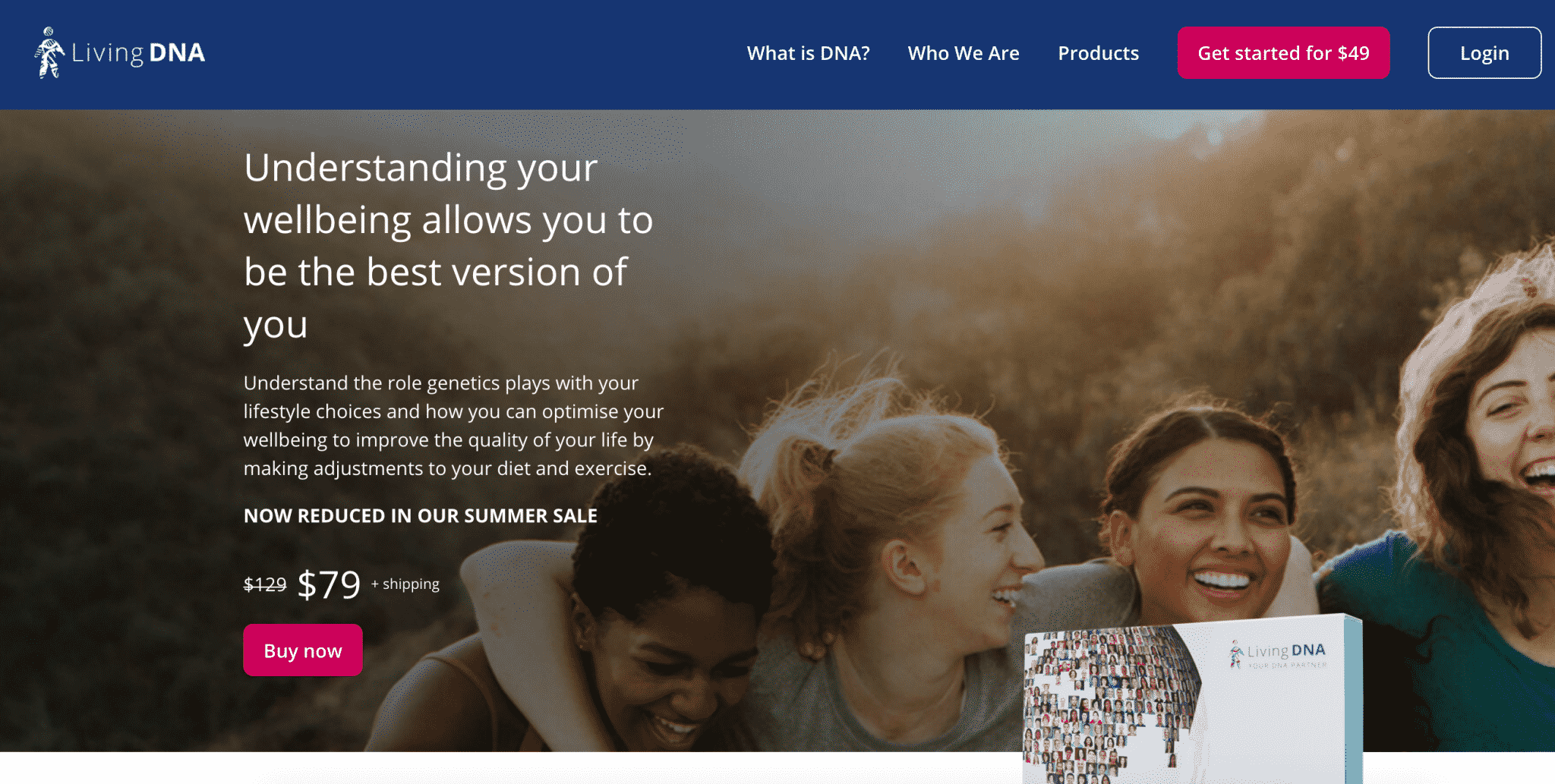
While Living DNA Wellbeing ($129) doesn’t yet include any genetic health risk or carrier status reports, it does offer the most wellness reports, including several about fitness. However, the Wellbeing test does not include ethnicity information or DNA matches—for those, you’ll need either its ancestry test ($99) or the ancestry and wellbeing combo test ($179). (The company also offers a $49 “Starter Kit” that includes DNA matches and some basic ethnicity estimates and health/wellness reports.) Living DNA’s tests are available worldwide.
While 23andMe and MyHeritage cover it in their genetic risk reports, Living DNA includes celiac disease in its wellbeing reports. All three companies agree that I have a slightly increased risk for celiac disease. Living DNA explains what celiac disease is (“an autoimmune disorder related to the body’s reaction to gluten”) and describes the symptoms.
It also offers suggestions for coping with the disease, such as eating gluten-free grains like corn and rice and keeping a personal food diary to track how different ingredients affect you. Like the other DNA testing companies reviewed here, LivingDNA recommends that you speak with a physician if you suspect you may have a condition “before making major dietary or lifestyle changes that could impact your health.”
Living DNA’s fitness reports are what set them apart from the competition. Mine suggest that my genetic inheritance may have both a positive and a negative impact on my athletic performance. On the plus side, my body needs less time than average to recover between workouts, so I can exercise at a higher frequency. That may benefit me in fast-paced activities, such as soccer and tennis. Another report says my tendon fibers may be more dense than average, making me less prone to tendon injuries while participating in sports.
On the negative side, three of the fitness reports suggest my body may not be well-suited for endurance training. Another report says that my muscles may possess more slow-twitch characteristics, meaning that (though I may have less strength than average) I can repeat more sets of an exercise with shorter rest periods.
The fitness reports generally line up with my experience. I perform better doing more repetitions, rather than lifting more weight. However, I’ve performed well as a long-distance runner, countering the test’s prediction that I’m genetically at a disadvantage for endurance training.
Living DNA notes that multiple genes may affect characteristics like muscle strength, and that the test results may be updated with future research. Just as DNA testing companies modify and refine ethnicity estimates over time as they learn more, they’re sure to expand and improve their health reports, too.
Review: If you’re interested in how your genes might affect your athletic performance, LivingDNA Wellbeing provides several relevant reports.
MyHeritage DNA Health
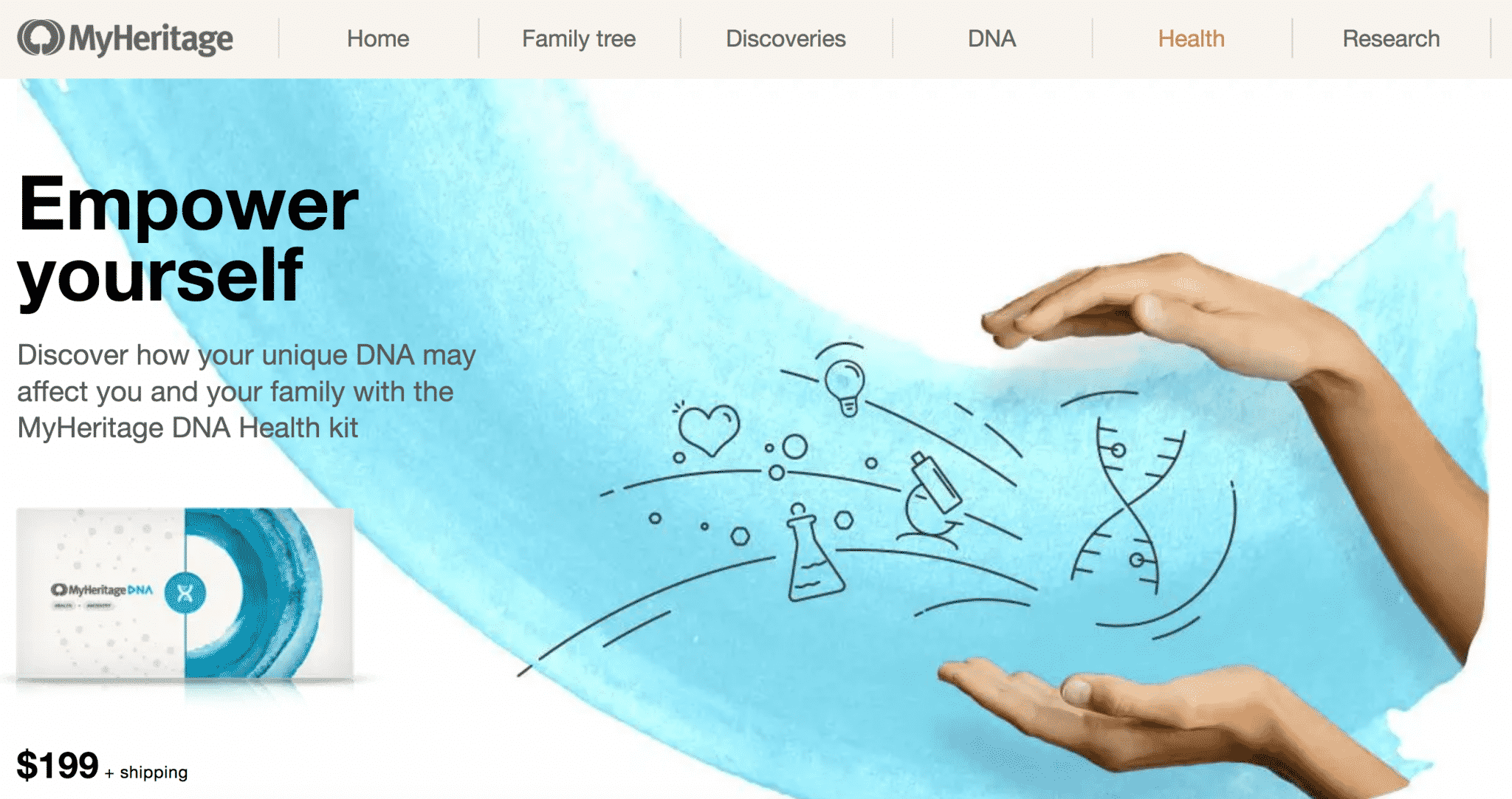
MyHeritage DNA Health ($199) provides polygenic risk reports for heart disease and breast cancer. Based on many variants, your polygenic risk score (PRS) estimates your genetic risk of developing a particular chronic condition (though, due to limitations on genetic studies, PRS scores are only available for people of primarily European descent). The Health test includes the ethnicity estimate and DNA matches that you get with the basic MyHeritage DNA test ($79). New and updated health reports via a Health subscription cost $75 for your first year, but $99 per year after that. MyHeritage doesn’t yet provide wellness reports.
If you’ve already taken the MyHeritage DNA test, you can upgrade to MyHeritage DNA Health for $120, and you don’t need to submit a new DNA sample. MyHeritage DNA Health is available in most US states (except New Jersey, New York and Rhode Island), plus many other countries.
Your MyHeritage DNA Health results include more than a dozen genetic risk reports, the most of any test in our roundup. Organized by risk level, the first group in my reports shows a slightly increased risk for just one condition: celiac disease. The next group shows that I have an average risk of developing 15 conditions, including three for which there are polygenic risk reports: heart disease, high blood pressure and type 2 diabetes.
All the reports describe the condition and tell how environmental and lifestyle factors may affect your risk. They also describe steps you can take to reduce your risk and take advantage of regular screening and early detection. For example, the report on celiac disease says that 95% of cases of the disease are linked to genetics. It also notes that the disease is most common among people of European ancestry, and that adopting a gluten-free diet is often recommended for someone with the disease.
Both MyHeritage DNA Health and 23andMe report on your genetic risk for late-onset Alzheimer’s disease. 23andMe looks for just the most common genetic variant associated with the disease, and my report says I don’t have it. But MyHeritage analyzes three variants associated with Alzheimer’s disease, and my report says that I do have one of them. It’s a protective variant against the disease, and having it suggests that I have a slightly decreased risk of developing Alzheimer’s disease.
The carrier status reports cover more than 20 conditions, including cystic fibrosis, sickle cell anemia and Tay-Sachs disease. Each report describes the disease and the variants analyzed. For example, the report on cystic fibrosis describes the signs and symptoms, and notes that it’s much more common in people of European descent than in people of African or Asian descent.
Review: If you want to find out if your genes put you at an increased risk for developing any health conditions, MyHeritage DNA Health covers the most ground.
A version of this article appeared in the September/October 2020 issue of Family Tree Magazine.
ADVERTISEMENT



